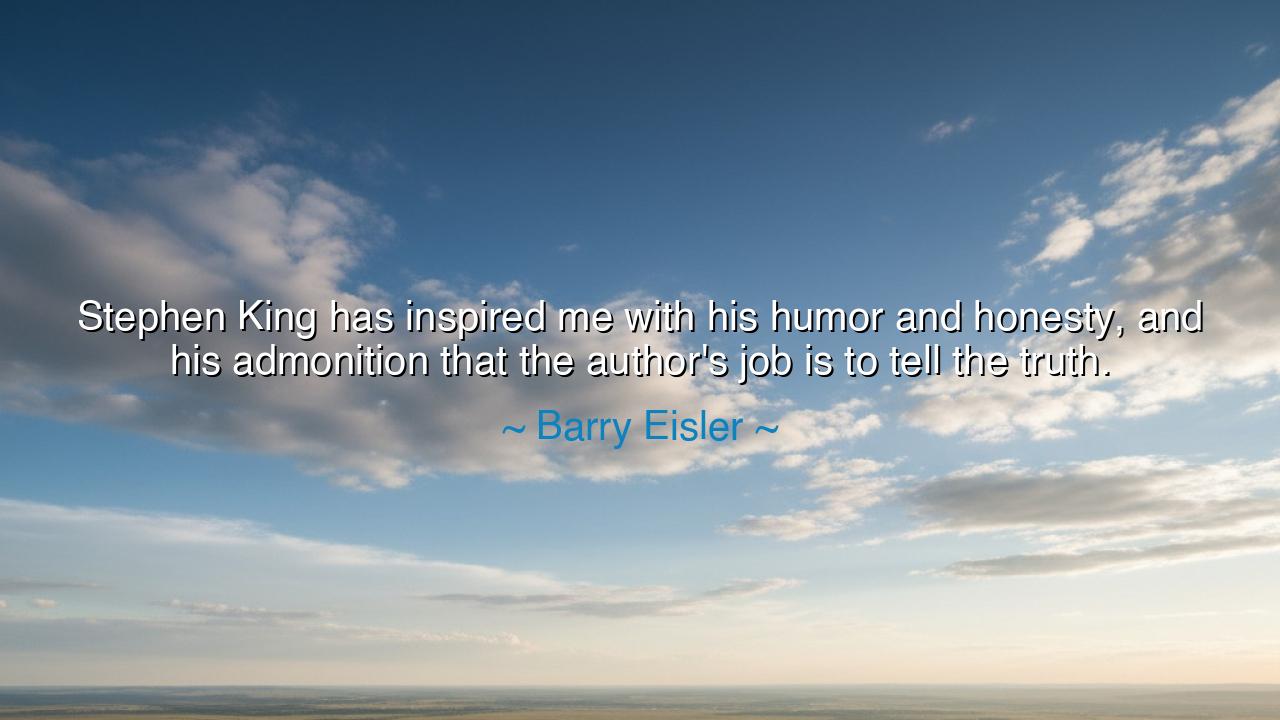
Stephen King has inspired me with his humor and honesty, and his
Stephen King has inspired me with his humor and honesty, and his admonition that the author's job is to tell the truth.






When Barry Eisler said, “Stephen King has inspired me with his humor and honesty, and his admonition that the author’s job is to tell the truth,” he spoke of a calling older than ink and paper — the sacred duty of the storyteller. His words echo through the centuries, reminding us that the task of the writer is not to comfort, nor to flatter, but to reveal. To tell the truth, as Stephen King teaches, is not merely to recount facts, but to uncover the beating heart beneath them — to illuminate the fears, the hopes, and the contradictions that make us human. Eisler recognizes that in King’s humor and honesty, there lies not just craft, but courage: the courage to face reality without disguise, and to transform it into art.
For the meaning of this quote lies in the union of two virtues — truth and humor — both of which demand profound understanding of the human soul. Truth, when spoken plainly, can wound or liberate; humor, when used wisely, can heal and reveal. Stephen King, though known for tales of terror and darkness, has always laced his storytelling with warmth, irony, and laughter — not to diminish pain, but to show that even in the shadow, light endures. Eisler, himself a writer of thrillers, finds in King’s balance a model for how to approach the craft with both honesty and humility. To write truthfully is to honor life as it is, not as we wish it to be — and to laugh, even softly, is to remind the reader that truth need not destroy; it can redeem.
The origin of King’s “admonition” that the author’s job is to tell the truth can be traced to his reflections in On Writing, where he insists that fiction is a “lie” that tells deeper truths. Beneath the monsters and ghosts, King writes of fear, love, guilt, and redemption — the truths that haunt us far more than any creature. His humor, often self-deprecating and earthy, grounds these truths in humanity. He laughs at himself, and by doing so, allows the reader to laugh at their own fears. Eisler, a writer shaped by the real-world shadows of politics and espionage, sees in King’s philosophy a guiding light: that the greatest power of the pen is not invention, but revelation.
This wisdom has been known to storytellers since ancient times. The Greek dramatist Sophocles, when asked why his tragedies endured, said that he wrote “to show men as they are, not as they pretend to be.” Like King, Sophocles told uncomfortable truths — about pride, destiny, and the blindness of the powerful. And like King, he used the humor of irony to expose hypocrisy and hubris. Across millennia, the message remains the same: the writer who serves truth serves humanity. Lies may win applause for a moment, but truth, once spoken, echoes forever.
Consider also the story of Mark Twain, another writer whose humor was his sword of truth. Twain wrapped his critiques of slavery, greed, and ignorance in laughter, making his readers smile even as he forced them to confront their own reflection. He knew, as King and Eisler know, that truth is best received when softened by wit. A harsh sermon divides, but a clever jest opens hearts. In this way, humor becomes not escape, but revelation — a mirror through which truth can be seen without turning away.
Eisler’s reverence for Stephen King’s honesty speaks to a deeper understanding of what it means to create. To be honest in art is not simply to avoid deceit; it is to resist the temptation of comfort. The writer must stand against falsehood — not just the lies of others, but their own self-deception. The author who tells the truth must look into the abyss of human frailty, and yet still find meaning in it. Humor becomes their companion in this journey, keeping despair from turning to cynicism. As King himself has shown, to laugh amidst horror is not denial; it is defiance — the soul’s refusal to surrender to darkness.
So, my listener, let this lesson take root in your heart: to live truthfully is to write truthfully, whether your medium is words, deeds, or daily life. Do not hide behind false pleasantries or fear of offense. Speak and act with sincerity, but temper your truth with compassion, as humor tempers gravity. Remember that honesty without empathy becomes cruelty, and humor without truth becomes emptiness. Seek balance, as Eisler found in King — let your honesty reveal, and your laughter heal.
For in the end, Barry Eisler’s reflection is not only about writing, but about living. Each of us is the author of our own story, and like the masters before us, we are called to tell it with courage. Let truth be your ink, humor your light, and honesty your guide. For in a world that hides behind masks and illusions, the one who dares to speak truthfully — and to smile while doing it — becomes not only a writer of stories, but a keeper of wisdom, and a bringer of light.






AAdministratorAdministrator
Welcome, honored guests. Please leave a comment, we will respond soon